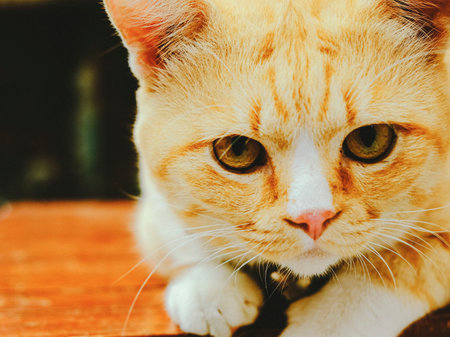1. What Are Breakaway Collars?
Breakaway collars are specially designed collars for cats that prioritize safety. Unlike traditional collars, these collars feature a quick-release mechanism that allows them to snap open when pressure is applied. This design helps prevent cats from getting caught on objects like branches, fences, or furniture, reducing the risk of choking or injury.
How Do Breakaway Collars Work?
The key feature of a breakaway collar is its safety buckle. When a cat’s collar gets snagged on something, the buckle automatically releases, freeing the cat from potential danger. This is especially important for adventurous felines who love to climb and explore both indoors and outdoors.
Why Are They Designed Specifically for Cats?
Cats are naturally curious and agile creatures, often squeezing into tight spaces or jumping onto high surfaces. Because of this, they are more likely to get their collars stuck compared to dogs. A breakaway collar ensures that if your cat ever finds itself in a tricky situation, it can escape without harm.
Key Benefits of Breakaway Collars
| Feature | Benefit |
|---|---|
| Quick-release buckle | Prevents choking hazards if caught on an object |
| Designed for cats | Ensures safety while allowing identification tags |
| Lightweight materials | Comfortable for daily wear |
| Variety of designs | Keeps your cat stylish while staying safe |
Should All Cats Wear Breakaway Collars?
Yes! Whether your cat is an indoor pet or enjoys supervised outdoor time, a breakaway collar adds an extra layer of protection. Even indoor cats can get their collars stuck on furniture or household items, making a breakaway collar a must-have for feline safety.
2. The Dangers of Traditional Collars for Cats
Many cat owners assume that any collar is better than no collar, but traditional collars can actually pose serious risks to your feline friend. Unlike breakaway collars, standard collars do not have a safety mechanism to release if your cat gets caught on something. This can lead to choking, injuries, or even worse.
Choking Hazards and Strangulation Risks
Cats are naturally curious and love to explore tight spaces, climb trees, and squeeze into small areas. If they are wearing a traditional collar that doesn’t break away under pressure, they can easily get stuck. The collar may become snagged on furniture, fences, or branches, leading to choking or strangulation.
Paw and Mouth Injuries
When a cat feels uncomfortable with their collar or if it gets caught on something, they may instinctively try to free themselves by using their paws or teeth. This can result in serious injuries such as:
- Paw injuries: Cats may accidentally get their leg stuck inside the collar while trying to remove it, causing sprains or cuts.
- Mouth and jaw injuries: Some cats manage to get their lower jaw caught inside the collar while scratching at it, leading to painful wounds and difficulty eating or drinking.
Comparison: Traditional vs. Breakaway Collars
| Feature | Traditional Collar | Breakaway Collar |
|---|---|---|
| Releases Under Pressure | No | Yes |
| Reduces Choking Risk | No | Yes |
| Prevents Paw & Jaw Injuries | No | Yes |
| Keeps ID Tags Secure | Yes | Yes |
| Ideal for Outdoor & Indoor Cats | No (Higher Risk) | Yes (Safer Option) |
The Importance of Choosing the Right Collar
A breakaway collar is designed with a safety clasp that pops open when pressure is applied, preventing your cat from getting stuck or injured. While traditional collars might seem secure, they can be dangerous if your cat finds themselves in a risky situation. By choosing a breakaway collar, you’re ensuring your feline companion stays safe while still being able to wear important identification tags.

3. Key Benefits of Breakaway Collars
Breakaway collars are designed with your cat’s safety in mind. Unlike traditional collars, these special collars have a built-in safety mechanism that allows them to snap open under pressure. This feature can be lifesaving in situations where your cat gets caught on an object, preventing serious injuries or even strangulation.
Prevents Strangulation
Cats love to explore, climb, and squeeze into tight spaces. Unfortunately, this curiosity can sometimes lead to dangerous situations where their collar gets snagged on furniture, tree branches, or fences. A breakaway collar ensures that if this happens, the collar will release, reducing the risk of choking or suffocation.
Enhances Your Cat’s Safety Indoors and Outdoors
Whether your cat is an indoor-only pet or an outdoor adventurer, a breakaway collar adds an extra layer of protection. Even indoor cats can find themselves in risky situations, such as getting stuck on household items like doorknobs or blinds. For outdoor cats, the risk increases with encounters involving bushes, fences, and other obstacles.
Avoids Collar-Related Injuries
Traditional collars can cause injuries if they become too tight or get caught on something. Common issues include neck abrasions, hair loss around the neck, and even more severe injuries if a cat struggles to free itself. Breakaway collars minimize these risks by releasing when necessary.
Comparison: Traditional vs. Breakaway Collars
| Feature | Traditional Collar | Breakaway Collar |
|---|---|---|
| Releases Under Pressure | No | Yes |
| Prevents Strangulation | No | Yes |
| Safe for Indoor & Outdoor Cats | No | Yes |
| Permanently Stays on Neck | Yes | No (Releases When Necessary) |
4. How to Choose the Right Breakaway Collar
Selecting the best breakaway collar for your cat is essential for their safety and comfort. There are a few key factors to consider, including material, fit, and additional safety features. Below, we’ll break down what to look for when choosing the right collar for your feline friend.
Material Matters
The material of the collar affects both comfort and durability. Here’s a quick comparison of common materials:
| Material | Pros | Cons |
|---|---|---|
| Nylon | Durable, lightweight, comes in various colors and patterns | May fray over time if not high quality |
| Leather | Stylish, long-lasting, softens with wear | More expensive, may be less flexible |
| Elastic Blend | Comfortable, stretches for easy removal | Less durable, may lose elasticity over time |
Finding the Perfect Fit
A proper fit ensures your cat’s collar is secure but not too tight. Follow these tips:
- Two-Finger Rule: You should be able to fit two fingers snugly between the collar and your cat’s neck.
- Adjustability: Look for collars with adjustable straps to accommodate growth or weight changes.
- Lightweight Design: A heavy collar can be uncomfortable for cats, especially smaller ones.
Additional Safety Features to Consider
A good breakaway collar should have extra features that enhance safety and convenience:
- Reflective Strips: Improves visibility in low light conditions.
- ID Tag Compatibility: Ensure there’s a place to attach an ID tag in case your cat gets lost.
- Bell Attachment: Helps you keep track of your cat’s whereabouts and can deter hunting behavior.
- High-Quality Breakaway Buckle: The buckle should release easily under pressure but stay secure during normal activity.
Final Tips When Choosing a Collar
If possible, test the breakaway function before purchasing. Gently tug on the buckle to ensure it releases properly under pressure. Additionally, monitor your cat after putting on a new collar to make sure they are comfortable and not trying to remove it excessively.
By considering material, fit, and safety features, you can find a breakaway collar that keeps your feline safe while ensuring their comfort.
5. Tips for Introducing a Breakaway Collar to Your Cat
Getting your cat used to a breakaway collar can take time, especially if they’ve never worn one before. The key is patience and positive reinforcement. Here are some helpful tips to make the transition smoother for both you and your feline friend.
Start Slow and Let Them Explore
Before putting the collar on your cat, let them sniff and investigate it. Place it near their favorite resting spot so they can get accustomed to its presence.
Choose the Right Fit
A well-fitted collar ensures comfort and safety. Use the “two-finger rule” – you should be able to fit two fingers between the collar and your cat’s neck.
| Collar Fit | Description |
|---|---|
| Too Tight | Might cause discomfort or restrict movement. |
| Too Loose | Your cat may slip out of it easily. |
| Just Right | A snug fit that allows two fingers between the collar and the neck. |
Add Familiar Scents
If your cat is hesitant, try rubbing the collar with their bedding or a soft cloth that carries their scent. This can make it feel more familiar and less intimidating.
Use Positive Reinforcement
Praise your cat and offer treats when they tolerate wearing the collar, even if its just for a few seconds at first. Gradually increase the duration over time while rewarding good behavior.
Supervise Initial Wear
The first few times your cat wears the collar, keep an eye on them to ensure they don’t panic or try to remove it aggressively. If they seem distressed, take a break and try again later.
Avoid Forcing It
If your cat resists strongly, don’t force them to wear it immediately. Give them short exposure sessions until they become more comfortable.
Add an ID Tag Once They’re Comfortable
Once your cat is used to wearing the collar, attach an ID tag with their name and your contact information. This adds an extra layer of security in case they ever get lost.

